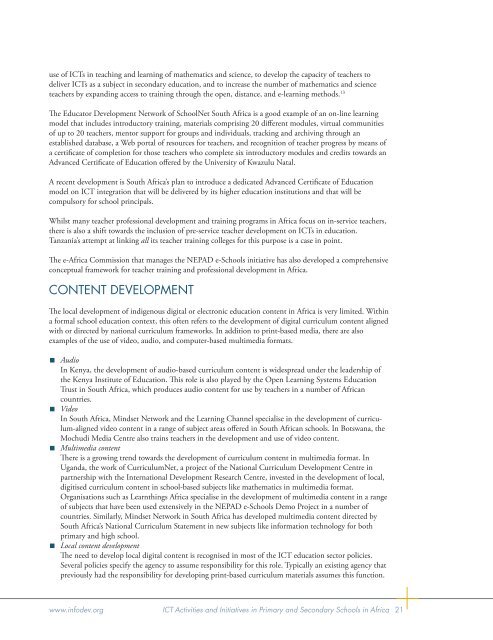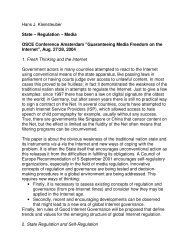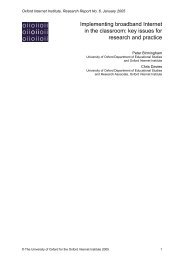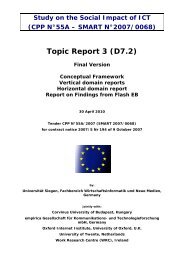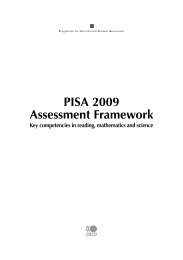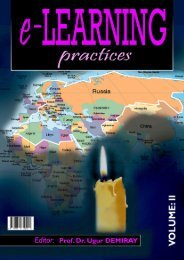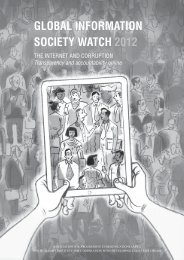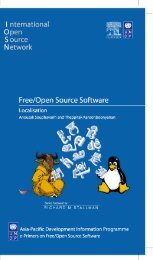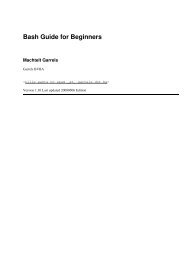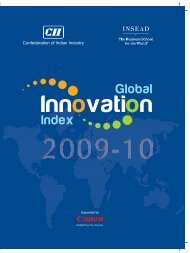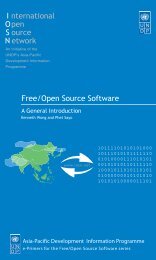SURVEY OF ICT AND EDUCATION IN AFRICA - infoDev
SURVEY OF ICT AND EDUCATION IN AFRICA - infoDev
SURVEY OF ICT AND EDUCATION IN AFRICA - infoDev
- No tags were found...
You also want an ePaper? Increase the reach of your titles
YUMPU automatically turns print PDFs into web optimized ePapers that Google loves.
use of <strong>ICT</strong>s in teaching and learning of mathematics and science, to develop the capacity of teachers todeliver <strong>ICT</strong>s as a subject in secondary education, and to increase the number of mathematics and scienceteachers by expanding access to training through the open, distance, and e-learning methods. 13The Educator Development Network of SchoolNet South Africa is a good example of an on-line learningmodel that includes introductory training, materials comprising 20 different modules, virtual communitiesof up to 20 teachers, mentor support for groups and individuals, tracking and archiving through anestablished database, a Web portal of resources for teachers, and recognition of teacher progress by means ofa certificate of completion for those teachers who complete six introductory modules and credits towards anAdvanced Certificate of Education offered by the University of Kwazulu Natal.A recent development is South Africa’s plan to introduce a dedicated Advanced Certificate of Educationmodel on <strong>ICT</strong> integration that will be delivered by its higher education institutions and that will becompulsory for school principals.Whilst many teacher professional development and training programs in Africa focus on in-service teachers,there is also a shift towards the inclusion of pre-service teacher development on <strong>ICT</strong>s in education.Tanzania’s attempt at linking all its teacher training colleges for this purpose is a case in point.The e-Africa Commission that manages the NEPAD e-Schools initiative has also developed a comprehensiveconceptual framework for teacher training and professional development in Africa.Content DevelopmentThe local development of indigenous digital or electronic education content in Africa is very limited. Withina formal school education context, this often refers to the development of digital curriculum content alignedwith or directed by national curriculum frameworks. In addition to print-based media, there are alsoexamples of the use of video, audio, and computer-based multimedia formats.nnnnAudioIn Kenya, the development of audio-based curriculum content is widespread under the leadership ofthe Kenya Institute of Education. This role is also played by the Open Learning Systems EducationTrust in South Africa, which produces audio content for use by teachers in a number of Africancountries.VideoIn South Africa, Mindset Network and the Learning Channel specialise in the development of curriculum-alignedvideo content in a range of subject areas offered in South African schools. In Botswana, theMochudi Media Centre also trains teachers in the development and use of video content.Multimedia contentThere is a growing trend towards the development of curriculum content in multimedia format. InUganda, the work of CurriculumNet, a project of the National Curriculum Development Centre inpartnership with the International Development Research Centre, invested in the development of local,digitised curriculum content in school-based subjects like mathematics in multimedia format.Organisations such as Learnthings Africa specialise in the development of multimedia content in a rangeof subjects that have been used extensively in the NEPAD e-Schools Demo Project in a number ofcountries. Similarly, Mindset Network in South Africa has developed multimedia content directed bySouth Africa’s National Curriculum Statement in new subjects like information technology for bothprimary and high school.Local content developmentThe need to develop local digital content is recognised in most of the <strong>ICT</strong> education sector policies.Several policies specify the agency to assume responsibility for this role. Typically an existing agency thatpreviously had the responsibility for developing print-based curriculum materials assumes this function.www.infodev.org <strong>ICT</strong> Activities and Initiatives in Primary and Secondary Schools in Africa 21


